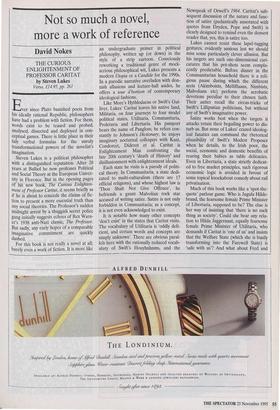Not so much a novel, more a work of reference
David Nokes
THE CURIOUS ENLIGHTENMENT OF PROFESSOR CARITAT by Steven Lukes Verso, £14.95, pp. 261 Ever since Plato banished poets from his ideally rational Republic, philosophers have had a problem with fiction. For them, words exist to be teased and probed, analysed, dissected and deployed in con- ceptual games. There is little place in their tidy verbal formulas for the unruly transformational powers of the novelist's imagination.
Steven Lukes is a political philosopher with a distinguished reputation. After 20 years at Balliol he now professes Political and Social Theory at the European Univer- sity in Florence. But in the opening pages of his new book, The Curious Enlighten- ment of Professor Caritat, it seems briefly as if he is about to concede the claims of fic- tion to present a more essential truth than any social theories. The Professor's sudden midnight arrest by a thuggish secret police gang initially suggests echoes of Rex Warn- er's 1938 anti-Nazi classic, The Professor. But sadly, any early hopes of a comparable imaginative commitment are quickly dashed.
For this book is not really a novel at all; barely even a work of fiction. It is more like an undergraduate primer in political philosophy, written up (or down) in the style of a strip cartoon. Consciously reworking a traditional genre of mock- serious philosophical wit, Lukes presents a modern Utopia or a Candide for the 1990s. In a parodic narrative overladen with don- nish allusions and lecture-hall asides, he offers a tour d'horizon of contemporary ideological fashions. Like More's Hythlodaeus or Swift's Gul- liver, Lukes' Caritat leaves his native land, Militaria, on four journeys to four model political states, Utilitaria, Communitaria, Proletaria and Libertaria. His passport bears the name of Pangloss; he refers con- stantly to Johnson's Dictionary; he enjoys imaginary nocturnal colloquys with Kant, Condorcet, Diderot et al. Caritat is Enlightenment Man confronting the late 20th century's 'death of History' and disillusionment with enlightenment ideals.
Each state he visits is a parody of politi- cal theory. In Communitaria, a state dedi- cated to multi-culturalism (there are 17 official religions), and whose highest law is `Thou Shalt Not Give Offence', he befriends a gaunt Malvolian rock star accused of writing satire. Satire is not only forbidden in Communitaria; as a concept, it is not even acknowledged to exist.
It is notable how many other concepts `don't exist' in the states that Caritat visits. The vocabulary of Utilitaria is 'oddly defi- cient, and certain words and concepts are simply unknown'. There are obvious paral- lels here with the rationally reduced vocab- ulary of Swift's Houyhnhnms, and the Newspeak of Orwell's 1984. Caritat's sub- sequent discussion of the nature and func- tion of satire (pedantically annotated with quotes from Dryden, Pope and Swift) is clearly designed to remind even the densest reader that, yes, this is satire too.
Lukes cannot resist these lapel-tugging gestures, evidently anxious lest we should miss some particularly clever allusion. But his targets are such one-dimensional cari- catures that his pot-shots seem compla- cently predictable. Before dinner in the Communitarian household there is a reli- gious pause during which the different sects (Akimboists, Mellifluans, Nimbists, Malvolians etc) perform the acrobatic devotions peculiar to their chosen faith. Their antics recall the circus-tricks of Swift's Lilliputian politicians, but without any of Swift's imaginative power.
Satire works best when the targets it attacks retain their beguiling power to dis- turb us. But none of Lukes' crazed ideolog- ical fanatics can command the rhetorical plausibility of Swift's Modest Proposer when he details, to the Irish poor, the social, economic and domestic benefits of rearing their babies as table delicacies. Even in Libertaria, a state strictly dedicat- ed to free market principles, such rigorous economic logic is avoided in favour of some topical knockabout comedy about rail privatisation.
Much of this book works like a 'spot-the- quote' parlour game. Who is Jugula Hilde- brand, the fearsome female Prime Minister of Libertaria, supposed to be? The clue is her way of insisting that 'there is no such thing as society'. Could she bear any rela- tion to Hilda Juggernaut, equally fearsome female Prime Minister of Utilitaria, who demands if Caritat is 'one of us' and insists that the Welfare State (which she is busily transforming into the Farewell State) is `safe with us'? And what about Fred and Karl, those two kindly old fishermen that Caritat meets in Proletaria. What might we expect them to say? Sure enough, Fred insists that religion is 'the opium of the people', and Karl proposes his favourite formula: 'From each according to his abili- ty; to each according to his need'. Some of these allusions are genuinely comic, and there is a nice set-piece when Fred and Karl replay dialogue from the Mad Hat- ter's Tea Party. But for the most part we seem to be browsing through a dictionary of quotations, from Adam Smith's Invisible Hand at the start to Forster's 'only connect' at the end.
One theme runs right through the book — the denial of rights. 'We don't have the concept of rights', Caritat is told in Utili- taria. 'Individuals don't have rights', says his host in Communitaria. 'We don't need rights', says Karl in Proletaria. But what are these rights that Lukes would have us cherish? Following in the tradition of his chosen Enlightenment antecedents he con- cludes not with a revolutionary rallying cry but with an ironic retreat. His version of Voltaire's `cultiver votre jardin' is a vision of young idealists living in tree-house ham- mocks, 'defending the trees against bull- dozers'. Enlightenment Man is finally reborn as a Friend of the Earth.



















































































 Previous page
Previous page